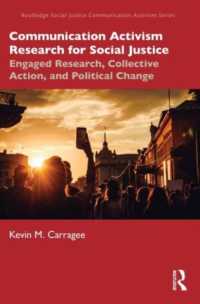- ホーム
- > 洋書
- > 英文書
- > Literary Criticism
Full Description
The Body Beseiged: The Embodiment of Historical Memory in Nina Bouraoui and Leïla Sebbar by Helen Vassallo brings together the work of two important contemporary writers, Nina Bouraoui and Leïla Sebbar. Both authors embody a significant historical divide (they are half French and half Algerian), and each author's work returns unfailingly to the legacy of opposition engendered by the colonial past that France and Algeria share: neither Bouraoui nor Sebbar claims any intention to write about the Algerian War of Independence, and yet its impact is felt throughout all of the texts chosen for discussion. This inescapable omnipresence of the Algerian War is conceptualized here as "embodied memory," a corporeal impulse to write about a war whose legacy is transmitted to these "second-generation" writers rather than a conscious decision to engage with the historical aspect of their personal heritage. Both authors suffer a culturally imposed "de-territorialization" in their life and their early autobiographical narratives, and both subsequently undergo a voluntary "displacement," undertaking literal and psychological journeys to map out routes towards a sense of self, of belonging, and ultimately of "re-territorialization." However, the analysis reveals how this move from de-territorialization to re-territorialization is accompanied by a shift from internalization (through memory and silence) to externalization (via articulation and community): rather than using the individual as symbolic of the universal, Bouraoui's and Sebbar's life writing acknowledges that their experience begins with a universal, historical, or social context, and represents a personal act of remembrance which is key to the recovery of historical memory, and to the negotiation of an appropriate space for this memory. At a time of "reconciliation" and remembrance, the analysis exposes and probes open wounds in the Franco-Algerian relationship through a close focus on the autobiographical writings of two authors who embody both (hi)stories, and whose texts represent a site of this "embodied memory."
Contents
Acknowledgements
Introduction: Nina Bouraoui and Leïla Sebbar, Embodying the Trauma of "Algeria Lost"
Chapter 1: Embodying a Fractured Identity: Writing on the Divide in Nina Bouraoui's Garçon manqué and La Vie heureuse
Chapter 2: The Embodiment of Environment: Re-thinking Alienation and Re-constructing Identity in Nina Bouraoui's Poupée Bella and Mes Mauvaises Pensées
Chapter 3: The Pain of Algeria Remembered: Vestiges of Algeria in Exile. Leïla Sebbar's Lettres parisiennes: Histoires d'exil and Journal de mes Algéries en France
Chapter 4: A Linguistic Alienation: Finding an Affiliation to Arabic in French. Leïla Sebbar's Je ne parle pas la langue de mon père and L'arabe comme un chant secret
Conclusion: Sites of Embodied Memory: Towards the Possibility of "Algeria Regained"
Bibliography
Index
About the Author







